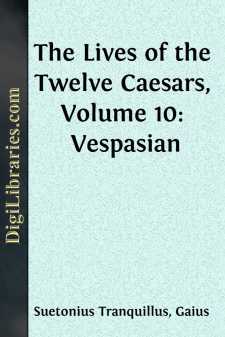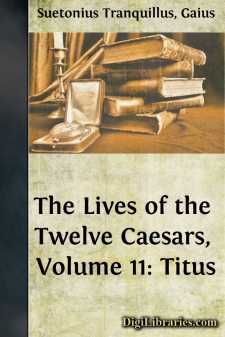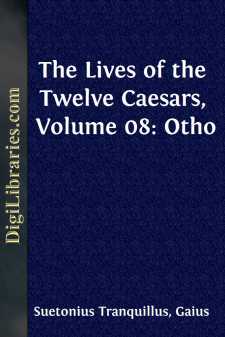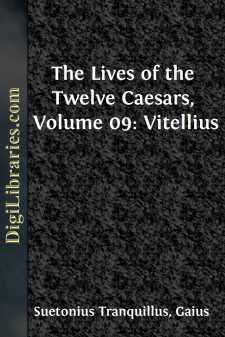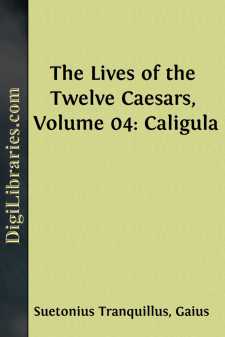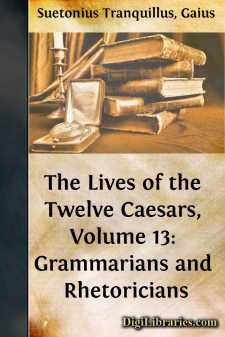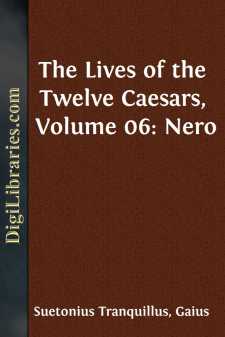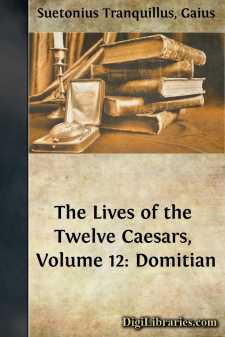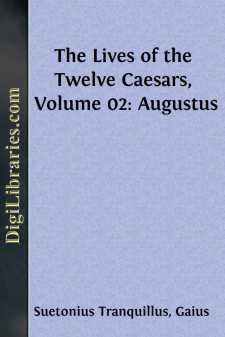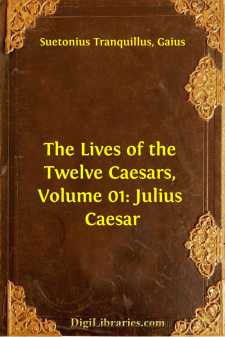Categories
- Antiques & Collectibles 13
- Architecture 36
- Art 48
- Bibles 22
- Biography & Autobiography 813
- Body, Mind & Spirit 142
- Business & Economics 28
- Children's Books 17
- Children's Fiction 14
- Computers 4
- Cooking 94
- Crafts & Hobbies 4
- Drama 346
- Education 46
- Family & Relationships 57
- Fiction 11829
- Games 19
- Gardening 17
- Health & Fitness 34
- History 1377
- House & Home 1
- Humor 147
- Juvenile Fiction 1873
- Juvenile Nonfiction 202
- Language Arts & Disciplines 88
- Law 16
- Literary Collections 686
- Literary Criticism 179
- Mathematics 13
- Medical 41
- Music 40
- Nature 179
- Non-Classifiable 1768
- Performing Arts 7
- Periodicals 1453
- Philosophy 64
- Photography 2
- Poetry 896
- Political Science 203
- Psychology 42
- Reference 154
- Religion 513
- Science 126
- Self-Help 84
- Social Science 81
- Sports & Recreation 34
- Study Aids 3
- Technology & Engineering 59
- Transportation 23
- Travel 463
- True Crime 29
The Lives of the Twelve Caesars, Volume 10: Vespasian
Description:
Excerpt
T. FLAVIUS VESPASIANUS AUGUSTUS.
(441)
I. The empire, which had been long thrown into a disturbed and unsetted state, by the rebellion and violent death of its three last rulers, was at length restored to peace and security by the Flavian family, whose descent was indeed obscure, and which boasted no ancestral honours; but the public had no cause to regret its elevation; though it is acknowledged that Domitian met with the just reward of his avarice and cruelty. Titus Flavius Petro, a townsman of Reate [721], whether a centurion or an evocatus [722] of Pompey's party in the civil war, is uncertain, fled out of the battle of Pharsalia and went home; where, having at last obtained his pardon and discharge, he became a collector of the money raised by public sales in the way of auction. His son, surnamed Sabinus, was never engaged in the military service, though some say he was a centurion of the first order, and others, that whilst he held that rank, he was discharged on account of his bad state of health: this Sabinus, I say, was a publican, and received the tax of the fortieth penny in Asia. And there were remaining, at the time of the advancement of the family, several statues, which had been erected to him by the cities of that province, with this inscription: "To the honest Tax-farmer." [723] He afterwards turned usurer amongst the Helvetii, and there died, leaving behind him his wife, Vespasia Pella, and two sons by her; the elder of whom, Sabinus, came to be prefect of the city, and the younger, Vespasian, to be emperor. Polla, descended of a good family, at Nursia [724], had for her father Vespasius Pollio, thrice appointed (442) military tribune, and at last prefect of the camp; and her brother was a senator of praetorian dignity. There is to this day, about six miles from Nursia, on the road to Spoletum, a place on the summit of a hill, called Vespasiae, where are several monuments of the Vespasii, a sufficient proof of the splendour and antiquity of the family. I will not deny that some have pretended to say, that Petro's father was a native of Gallia Transpadana [725], whose employment was to hire workpeople who used to emigrate every year from the country of the Umbria into that of the Sabines, to assist them in their husbandry [726]; but who settled at last in the town of Reate, and there married. But of this I have not been able to discover the least proof, upon the strictest inquiry.
II. Vespasian was born in the country of the Sabines, beyond Reate, in a little country-seat called Phalacrine, upon the fifth of the calends of December [27th November], in the evening, in the consulship of Quintus Sulpicius Camerinus and Caius Poppaeus Sabinus, five years before the death of Augustus [727]; and was educated under the care of Tertulla, his grandmother by the father's side, upon an estate belonging to the family, at Cosa [728]. After his advancement to the empire, he used frequently to visit the place where he had spent his infancy; and the villa was continued in the same condition, that he might see every thing about him just as he had been used to do....


